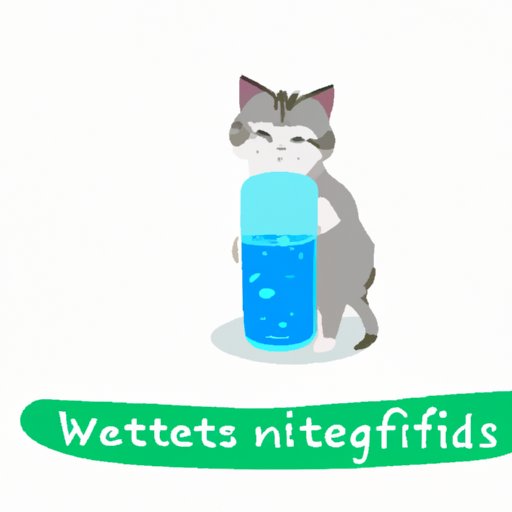
I. Introduction
As a cat owner, ensuring that your pet is healthy and happy is a top priority. One of the common issues that cat owners face is getting their feline friends to drink enough water. Cats are notorious for being picky drinkers, but low water intake can lead to a host of health problems. In this article, we will look at some of the best tips and advice to encourage your cat to drink more water, as well as the consequences of dehydration in cats.
II. Importance of Hydration
Just like humans, cats need water to survive and stay healthy. Water plays a crucial role in regulating body temperature, maintaining healthy organ function, and eliminating waste from the body. Low water intake can lead to a variety of health problems, including urinary tract infections, constipation, and kidney disease. This is why it’s so important to ensure that your cat drinks enough water on a daily basis.
III. Tips to Encourage Drinking
Here are some tips to encourage your cat to drink more water:
- Place Multiple Water Bowls Around the House: Cats prefer drinking from clean and fresh water, make sure drinking bowls are changed often, and are refilled with fresh water frequently. Place your cats’ drinking bowls in strategic positions in different parts of the house.
- Use Elevated Water Bowls: Cats generally prefer to drink from water bowls at a raised height, which is why you may want to consider investing in an elevated water bowl to encourage your cat to drink more. Elevating water bowls can also prevent spillage and litter from getting into the bowl.
- Add Flavor to Water: Some cats may be more likely to drink water that has a little flavor added to it. You can try adding a small amount of tuna water or chicken broth to your cat’s water to make it more appealing.
- Serve Water in a Fountain or Dripping Faucet: Some cats love drinking water from a moving source, such as a fountain or dripping faucet. If your cat enjoys playing with water, consider investing in a water fountain or leaving a dripping faucet on for them to drink from.
IV. Diet & Hydration
The food that your cat eats can also contribute to their hydration levels. Here are some things to consider:
- Importance of Diet in Hydration: Dry food contains only 10% to 12% moisture, while wet food contains up to 80% moisture. Feeding wet food to cats helps maintain hydration levels and healthy water turnover in the body. Ensure your cat’s diet includes enough wet food.
- Wet Food as a Source of Water: Wet food is an excellent source of water for cats. It’s important to choose high-quality wet food that is full of healthy ingredients to ensure your cat is getting the best nutrition possible.
- Selecting the Best Food for Hydration and Overall Health: When selecting cat food, read the label to make sure it has high moisture content and contains healthy ingredients. Also, speak to your vet about the best food options for your cat’s breed, age, and health concerns.
V. Recognizing Dehydration
Cats can have varying levels of hydration, and it’s important to monitor them to ensure they are drinking enough water. Here are some signs of dehydration to look out for:
- Less frequent urination
- Dark, concentrated urine
- Dry mouth and tacky gums
- Lethargy and loss of appetite
It’s important to act quickly if you notice any of these signs and encourage your cat to drink more water or seek veterinary attention if needed.
VI. Medical Reasons for Low Hydration
There are some health issues that can cause cats to have low hydration levels, such as kidney disease or urinary tract infections. If you’ve tried all of the tips mentioned above and your cat still isn’t drinking enough water, it’s important to seek veterinary care. Your vet can run tests to determine if there are any underlying health issues contributing to the low hydration levels.
VII. Conclusion
Ensuring that your cat is well hydrated is essential for their health and happiness. By following the above tips and ensuring your cat’s diet is rich in wet food and high-quality ingredients, you can ensure that your cat gets the hydration they need. Remember, it’s always important to seek veterinary attention if you notice any signs of dehydration or your cat still isn’t drinking enough water, as there may be an underlying health issue that needs to be addressed.
Final thoughts: Low water consumption can be a serious problem for cats, so it’s important to address it early. By implementing the tips above, you can encourage your cat to stay hydrated and healthy. Keep in mind that prevention is always better than cure, so take steps to ensure your cat is getting enough water before it becomes a problem.




